Sua Sponte
Alumnus Learns to Live of One's Own Accord
from the Record, Fall 2021
By Alexandra Evans
October 3, 1993. Mogadishu, Somalia...
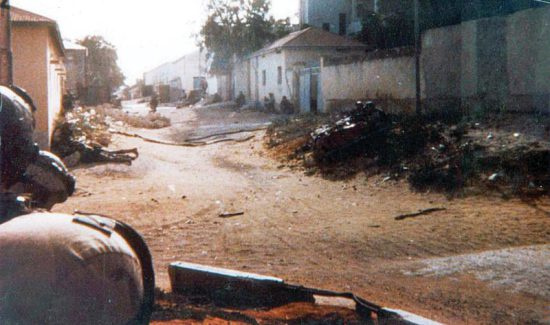
The acrid fumes of burning tires fill his nostrils as brown dust fills his eyes, his goggles having broken just before he exited the helicopter. His hands, though covered with sturdy leather gloves, are burning from the friction of the thick nylon rope down which he’s sliding. His boots hit the ground. Amidst the commotion of the Bakaara Market into which he has just dropped, he has the sickening realization that he and his men are taking on gunfire and one of his men is already badly injured.
Needing to get his injured comrade out of further harm’s way, he grabs a handheld radio to orchestrate evacuation. Between the gunfire raining down like hail and the tall buildings blocking the satellite signal, he can’t get anyone on the mic. There are no comms. No one is coming to help. It’s up to him to get his men out of that godforsaken market and back home to their loved ones.
Sua sponte.
Six Years Earlier
What became the guiding statement for his life is perhaps most surprising of all to First Sergeant Matt Eversmann ’88 (U.S. Army-Ret.) himself. Meaning “of one’s own accord,” sua sponte is a Latin phrase that serves as the motto for the Army’s 75th Ranger Regiment, in which Matt—as he insists on being called—served for eight years, including during the ill-fated battle that would later become known as Black Hawk Down.
“It means don’t wait around,” he says of the phrase. “In the absence of direct orders, you have to take responsibility and take action.”
A 20-year-old Matt would be shocked to know that his future self has taken this phrase so to heart because in the summer of 1987, while chopping wood at his family’s lumber yard, he was waiting for another, more proverbial, axe to fall—the call from then-Dean of Students Lewis Drew ’60 asking Matt not to return to Hampden-Sydney College for his senior year due to academic difficulty.
“I was in over my head from day one,” he admits. “No direction, no internal gyroscope, just doing what I thought I should do. As the youngest of four, I never had to do anything on my own until I got to Hampden-Sydney. I was decidedly immature.”
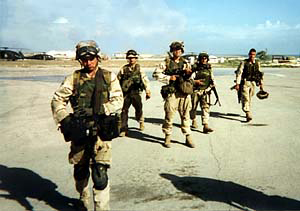
Originally from Bayshore, New York, Matt moved with his family to Natural Bridge, Virginia, in the ’70s when his father took a job as comptroller at Washington and Lee University. Assuming he would go to Washington and Lee or the Virginia Military Institute (VMI) like his brother, Matt walked into a college fair at Natural Bridge High his junior year and was greeted by a woman wearing a flowered hat. Like scores of Hampden-Sydney men before him, legendary former Dean of Admissions Anita Garland was Matt’s first introduction to the College, and his plans started to change.
“It’s hard to show up at Hampden-Sydney on a spring day and say ‘this sucks,’” Matt laughs. “I was sold.” But he soon found that the College’s academic rigor was not quite so welcoming, and despite throwing himself into life at Hampden-Sydney, even serving as Student Court chairman, he was falling behind.
“It was a valiant effort, but I just didn’t make the mark,” says Matt. “That was a valuable lesson for me. I, as an individual, have to show up. The College gave me all of the tools, but I had to deliver. Being put in a position to be truly independent is something I’ve never forgotten from my time at Hampden-Sydney.”
A New Kind of Brotherhood
With the sting of defeat still fresh, Matt was eager to prove to himself that he could do something hard. His next move wasn’t a total surprise. He may have been looking for independence, but he ended up falling back on a family tradition—the military. Matt’s father served in the ’50s; his sister was a nurse in the Army; his oldest brother was a merchant marine; and his youngest brother was a Marine Corps officer after graduating from VMI.
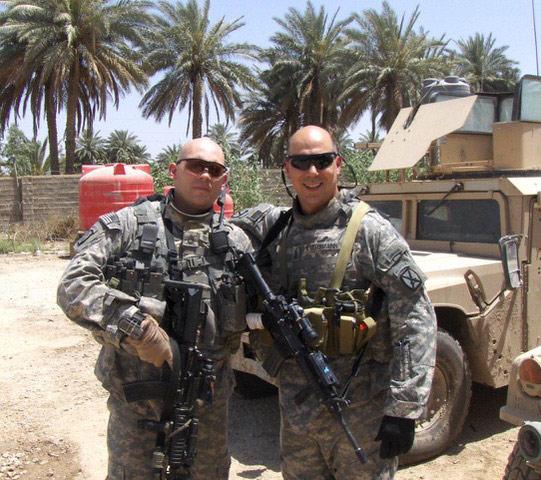
So in December of 1987 while his Sigma Chi brothers were together on the Hill, Matt walked into the Army recruiting station in Lexington to join another band of brothers. As he looked around the room filled with motivational posters encouraging him to be all he can be and to answer Uncle Sam’s call, his eyes landed on a poster of an African-American soldier in impeccably starched fatigues with a tan beret perched upon his head. “He was the most strapped dude I’d ever seen in my life,” Matt says admiringly. “Intimidating, motivating, and everything all at once.”
The recruiter walked into the room and asked Matt, “Any idea what you want to do?”
Pointing to the poster, Matt responded, “Yeah, I want to be like that guy.”
The recruiter replied, “Well I see you were an econ major. You should think about the finance corps.” “I didn’t end up in your office by being good at economics,” Matt reminded him.
The recruiter fed Matt a line about recruits not being able to join the Rangers right away, so Private Matt Eversmann was assigned to the 10th Mountain Division at Fort Drum in Watertown, New York.
Still eager to prove his mettle, Matt was frustrated that the light infantry unit had not seen combat in his first enlistment. “I remember scheming with my roommate, Mike Evans, to get assigned to a unit that would surely get called to fight,” Matt recalls in The Battle of Mogadishu, a 2005 book he co-edited. “...Why else would men subject themselves to endless hours of training? ...I can think of only one reason: to go to war.”
After four years with the 10th Mountain, Matt was still not battle tested.
“I really struggled at the end of that enlistment deciding whether to go back to the Hill or re-up,” Matt admits. “On one hand I had this whole new life with these great new friends, but on the other hand I had these incredibly fond memories of my time at Hampden-Sydney.”
Though, as Matt’s oldest brother advised him, “You can always go back to school. You can’t always jump out of planes.” So Matt reenlisted with the illustrious 75th Ranger Regiment.
Not If, But When
Matt would only have to wait another 16 months after re-upping to get his first taste of combat. When the Somali Democratic Republic collapsed in 1991, the east African country was thrust into civil war. Once a cosmopolitan destination for European elite, the now-decimated capital city of Mogadishu was a hotly contested territory. Somali warlord Mohamed Farrah Aidid used resource control and terror to assert dominance over the area.
After Aidid’s militia killed four and injured seven soldiers in two separate bombings in early August of 1993, President Bill Clinton approved the formation of Task Force Ranger, created for the sole purpose of dismantling Aidid’s operations.
It was to this end that Matt ended up in that marketplace on October 3. After being in country for a month and a half, Task Force Ranger geared up for its seventh mission after receiving credible intel of the whereabouts of two of Aidid’s top lieutenants. It was a routine task; something Rangers did all the time— catching bad guys.
However, for Matt personally, the day was not quite routine. In a twist of fate, his chalk leader—a chalk being a group of soldiers that deploy from a single aircraft—had been called home to the states on a family emergency, and in a well-practiced adjustment, second-in-command Matt took his place as chalk leader, his first time commanding in a real-world battle.
“In one sense, it truly wasn’t that big of a deal. It happens all the time,” Matt says of the change in command. “But it also brought a whole new level of responsibility. When you as a leader send a couple of guys off to do something on the battlefield, you might have to explain yourself to a wife or a parent because you’ve changed the course of their family history forever. That reality is a tough one. It’s tough for a young 20-something to have that kind of responsibility.”
In moments like this, Matt is a compelling mix of black and white and shades of gray. Some things are absolute: There is good; there is evil. When orders are issued, orders should be followed. But the how and when of these issues is more ambiguous. As a soldier, Matt’s training was innate and automatic. But as a husband, father, brother, and son, the responsibilities of battlefield decisions were not assumed lightly.
What was supposed to be a 30-minute snatch-and-go of Aidid’s henchmen that day devolved into an 18-hour firefight in which two Black Hawk helicopters were ripped from the sky by rocket-propelled grenades, 18 U.S. soldiers were killed, and more than 1,000 Somali men, women, and children lost their lives. Anything but routine.
On that day, under the pressure of small arms fire and life-and-death decision making with no one but him giving the orders, Matt was truly left to his own accord.
And he rose to the occasion. His actions over those 18 hours earned Matt a Bronze Star Medal with Valor device, awarded to armed service members for heroic achievement in combat.
In the immediate aftermath of Mogadishu, the press and politicians alike decried the operation as a failure— though it would later be regarded as a tactical success— and pulled the troops out of Somalia without giving them a chance to capture Aidid, pouring salt in the wounds of the men who fought so bravely that day and who saw the operation as anything but a failure. They executed their mission and achieved their aim, capturing the men they set out to.
Then came Mark Bowden, a journalist who wanted to tell the story of what happened in the marketplace from the perspective of the men who were there—not from the well-crafted narrative of politicians—preventing the battle and its heroes from receding into the annals of history under a cloud of conjecture.
Bowden’s first interview in preparation for the book that became Black Hawk Down was Matt Eversmann. Bowden says in the foreword of The Battle of Mogadishu, “Matt’s story just unfolded, with a richness of detail and reflection beyond my wildest expectations.” The book would be turned into a Ridley Scott-directed film of the same name in 2001, with Matt’s character the center around whom the action largely turns.
Matt Eversmann skyrocketed to fame after the release of Black Hawk Down in 2001. He went on press tours, walked red carpets, and was even nominated for a Teen Choice Award. No, wait, that was the actor Josh Hartnett, who portrayed Matt Eversmann in the movie.
Back to the real Matt. Following the blockbuster movie, Matt began travelling the country giving his account of the events in Mogadishu. “Being able to share the stories of people who maybe weren’t named in the book or the movie has become really important to me,” he says. As many of the characters in the movie were composite representations of several soldiers, the real Matt Eversmann is now a composite of the men he fought alongside that day.
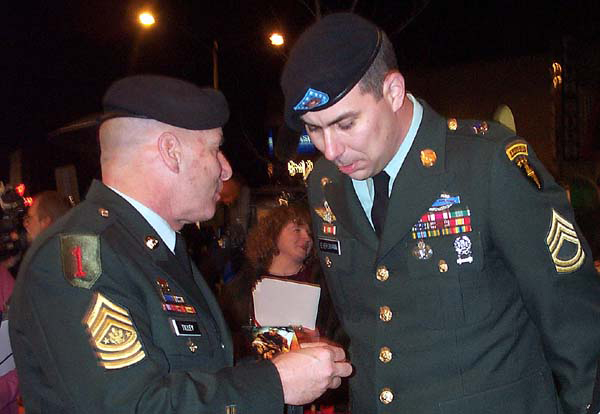
Post-Mogadishu
The aftermath of Mogadishu saw critical advances in U.S. ground combat preparation and execution, and Matt helped train up the next generation of service members. He was assigned to the Army War College and later taught ROTC at Johns Hopkins University. “Johns Hopkins was a really neat assignment. As an enlisted guy, it was a great opportunity to give every bit of information and wisdom I had to these young men and women,” Matt says. “But after a couple of years, it was hard to be away from the troops.
Matt’s last assignment was a 15-month deployment with the 10th Mountain Division living with Iraqi soldiers in Yusufiya during the Surge of 2007, training them to be an organized army to defeat al-Qaeda. “The Iraqi soldiers were warriors,” Matt says matter-of-factly. “They were fearless and quite proud of their country.”
While in Yusufiya, Matt and his company lived in an abandoned potato factory comprised of a couple of aluminum barns with makeshift plywood huts built inside. “It smelled just like Mogadishu. Burning plastic and garbage and sewage,” he remembers.
Matt describes the whole experience as austere, saying that as a Westerner, it was hard to comprehend the magnitude of the violence he saw. At their base, his company ran a small aid station staffed with a surgeon, a physician’s assistant, and several medics. Primarily there to care for battlefield casualties if immediate evacuation to Baghdad was not possible, the aid station saw its fair share of local patients as well.
“An Iraqi ambulance would come screaming up the road and pull out a litter, and there would be a bloody mess of a child who had been blown up crossing a bridge or a girl with acid burns on her face because she dared to learn to read,” he says, shaking his head. “How could someone willingly do that?”
Like Mogadishu, the Surge was considered a failure, but Matt once again points out the nuances of the situation. “I saw the dramatic change overnight of violence deescalation,” Matt says. “The Surge was necessary. Too many people were dying. Whether it was sustainable, that’s a separate conversation.”
At the end of that deployment, First Sergeant Matt Eversmann retired after serving his country for 20 years.
The Next Chapter
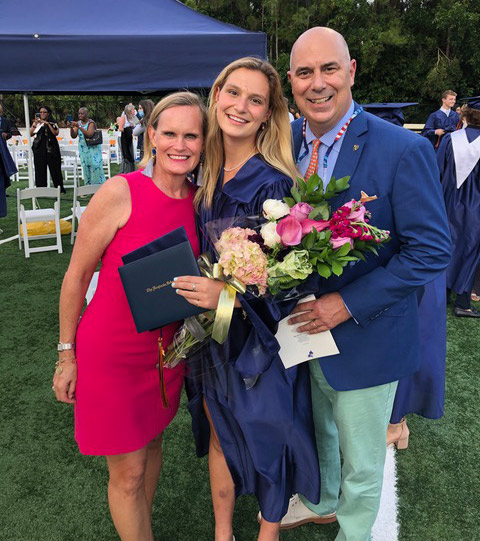
“Eversmann Advisory was born out of frustration,” says Matt of his latest venture. “The transition from active duty to this new world was far harder than I could have imagined. There were all these things that I didn’t know or assumed would be the same, and it was challenging. I probably made all the transition mistakes that a soldier could make.”
After taking off the uniform and donning civvies, Matt went on to hold several executive positions in private corporations, none of which lasted more than a few years.
“Coming out of the Army, I was a bit naïve. I thought leadership was leadership,” he says. “But there’s no organization outside of the military that has such a rigid hierarchy. It was really confusing to someone who was used to knowing exactly who I answered to and exactly who answered to me. The organization chart in corporate America was far more lateral than I was used to in the military.”
Knowing that he wasn’t the only veteran facing these obstacles, Matt and his wife, Tori, created Eversmann Advisory. Through workshops, seminars, and tailored hiring and onboarding processes, Matt provides education to veterans through training, coaching, and mentoring and educates employers on what they’re getting when they hire a veteran, resulting in lower turnover rates and higher satisfaction for both veteran and employer.
And the water cooler isn’t the only place where Matt is bridging the gap between civilians and military personnel. Knowing firsthand the power of media to help civilians understand the realities facing service members, Matt hosted a PBS documentary called Send Me in 2018, where he provides an inside look at the lives of combat medics stationed at Forward Operating Base Fenty in Afghanistan. Directed by Emmy Award–winning reporter and war correspondent Tim Malloy, the documentary provides rare coverage of service members deployed as part of Operation Resolute Support, the NATO-led mission to provide training and assistance to Afghan security forces and institutions.
The film takes an eerie turn as Matt leaves the Jalalabad Air Field on a Black Hawk helicopter—his first time on a Black Hawk since that day in Mogadishu 25 years earlier. Alarms go off in the cockpit signaling that the helicopter is being targeted from the ground, and the pilots launch flares to deflect possible fire. Finally, the threat passes. “If I never get on a Black Hawk again, that would be perfectly fine with me,” Matt laughs in an uncharacteristically vulnerable moment.
In preparation for Send Me, Matt consulted with prolific New York Times–bestselling author James Patterson. After the release of the documentary, Patterson reached out to Matt and asked him to collaborate on a project collecting the untold stories of America’s servicemen and -women. The result of that collaboration, Walk in My Combat Boots, was released in October of 2020 and immediately became a bestseller.
Patterson recalls in several interviews that he couldn’t even get his own father to talk about his experiences in World War II, “but Matt can get them to talk about it because he’s been there.”
Conducting hundreds of interviews, most of which were several hours long, Walk in My Combat Boots was a labor of love for Matt. “It was an amazing experience," he says. "These men and women have incredible stories to tell, and it was a privilege to help tell them.”
Matt may not be in uniform anymore, but when it comes to supporting his fellow war-fighters, this Ranger is still leading the way.
In 2000, Matt finally received his degree—a bachelor of arts, honoris causa— conferred to him by President Emeritus Samuel V. Wilson in honor of his bravery and service to country. “That was one of the greatest honors of my life,” Matt says. “And all I had to do was go to war for it.”


